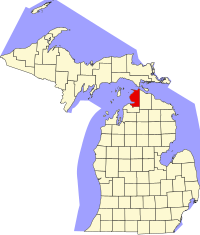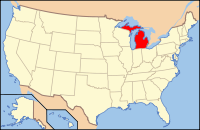Emmet County, Michigan
| Emmet County, Michigan | ||
|---|---|---|

Emmet County Building
|
||
|
||
 Location in the U.S. state of Michigan |
||
 Michigan's location in the U.S. |
||
| Founded | April 1, 1840 | |
| Named for | Robert Emmet | |
| Seat | Petoskey | |
| Largest city | Petoskey | |
| Area | ||
| • Total | 882 sq mi (2,284 km2) | |
| • Land | 467 sq mi (1,210 km2) | |
| • Water | 415 sq mi (1,075 km2), 47% | |
| Population | ||
| • (2010) | 32,694 | |
| • Density | 70/sq mi (27/km²) | |
| Congressional district | 1st | |
| Time zone | Eastern: UTC-5/-4 | |
| Website | www |
|
Emmet County is a county located in the U.S. state of Michigan. As of the 2010 census, the population was 32,694. The county seat is Petoskey.
Emmet County is located at the top of the mitten-shaped Lower Peninsula of Michigan, with Lake Michigan to the west, the Straits of Mackinac to the north, Cheboygan County to the east, and Charlevoix County to the south. Its rural areas are habitat for several endangered species. Long a center of occupation by the Odawa people, today the county is the base for the federally recognized Little Traverse Bay Bands of Odawa Indians.
The county was created by the Michigan Legislature on April 1, 1840, from Mackinac County. It was first named Tonedagana County and renamed Emmet County on March 8, 1843. Emmet County remained attached to Mackinac County for administrative purposes until county government was organized in 1853. The county was named for the Irish nationalist Robert Emmet, who in 1803 was tried and executed for high treason against the British king for leading a rebellion in Dublin.
Ottawa history records that Emmet County was thickly populated by a race of Indians that they called the Mush-co-desh, which means "the prairie tribe". The Mush-co-desh had an agrarian society and were said to have "shaped the land by making the woodland into prairie as they abandoned their old worn out gardens which formed grassy plains". Ottawa tradition claims that they slaughtered from forty to fifty thousand Mush-co-desh and drove the rest from the land after the Mush-co-desh insulted an Ottawa war party.
...
Wikipedia
